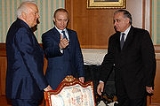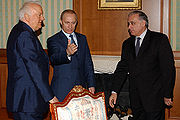
Sochi agreement
Encyclopedia
The Sochi agreement was a ceasefire
agreement ostensibly marking the end of the both the Georgian–Ossetian and Georgian–Abkhazian conflicts, signed in Sochi
on June 24, 1992 between Georgia
and South Ossetia
, the ceasefire with Abkhazia
on July 27, 1993.
, and North Ossetia (as the separatist South Ossetian government was still unrecognized; South Ossetian peacekeepers, however, served in the North Ossetian contingent). In addition, the OSCE did agree to monitor the ceasefire and to facilitate negotiations. The OSCE sought to eliminate sources of tension, support the existing ceasefire, and facilitate a broader political framework to alleviate long term disharmony.
, the placement of UN observers in the territory, and the resumption of talks to settle the dispute. In August of the same year UNOMIG was put in place as the UN monitoring force. The truce was violated on September 27 as Abkhaz forced ceased Sukhumi and declared victory. The pro-Georgian forces then withdrew to Tbilisi
, as Georgia joined the CIS and changed Russia's stance towards Georgia's on the matter.
A further Agreement on a Cease-fire and Separation of Forces
, also known as the 1994 Moscow Agreement, was agreed the following year.
Once again, on March 6-7, 2003, Georgian President Eduard Sheverdnadze
and Russian President Vladimir Putin
signed another agreement that sought to include economic rehabilitation, resumption of rail networks, and the attraction of international investment. This would happen to turn into a disappointment, especially for the Georgians.
 In 2003, Russian President Vladimir Putin met Georgian President Shevardnadze and Abkhazian PM Gennady Gagulia and set in motion a Sochi process that sought to create a Georgian-Russian-Abkhaz working groups on confidence building measures's (CBM). The parties sought to make it easier for the return of refugees and economic reconstruction. The Sochi process signified a regress from the multilateral to a bilateral format that left Georgia on its own to face Russia and the Abkhaz. It also was seen to undermine Georgia's argument that the Geneva process was the sole format for a comprehensive settlement of the conflict. In 2004, Russia were seen to violate the agreement as a Russian company begun maintenance work on the Sochi-Sukhumi railroad, which was legally Georgian, though controlled by Russia and the Abkhaz. The move was seen as a violation whereby restoration could only proceed in parallel with the safe return of Georgian refugees to Abkhazia beginning with the Gali district. However, there had been no progress on the return of refugees, and so, unilateral Russian actions on the railroad violated the Sochi agreement. <-- dead-->However, there had been no progress on the return of refugees.
In 2003, Russian President Vladimir Putin met Georgian President Shevardnadze and Abkhazian PM Gennady Gagulia and set in motion a Sochi process that sought to create a Georgian-Russian-Abkhaz working groups on confidence building measures's (CBM). The parties sought to make it easier for the return of refugees and economic reconstruction. The Sochi process signified a regress from the multilateral to a bilateral format that left Georgia on its own to face Russia and the Abkhaz. It also was seen to undermine Georgia's argument that the Geneva process was the sole format for a comprehensive settlement of the conflict. In 2004, Russia were seen to violate the agreement as a Russian company begun maintenance work on the Sochi-Sukhumi railroad, which was legally Georgian, though controlled by Russia and the Abkhaz. The move was seen as a violation whereby restoration could only proceed in parallel with the safe return of Georgian refugees to Abkhazia beginning with the Gali district. However, there had been no progress on the return of refugees, and so, unilateral Russian actions on the railroad violated the Sochi agreement. <-- dead-->However, there had been no progress on the return of refugees.
In 2008, U.S. President George W. Bush
and Putin made a last ditch attempt as incumbent presidents to resolve a protracted dispute over European missile defenses at anotjer Sochi summit. This followed Russian officials objecting to U.S. plans to deploy ballistic missile defenses (BMD) in Poland and the Czech Republic. They had claim that the stated American justification for the BMD deployments -- that the systems are needed to defend the United States and European countries against an emerging Iranian missile threat -- lacked credibility. Instead, they insisted the true objective of such moves along Russia's periphery was to weaken Russia's nuclear deterrent.http://www.worldpoliticsreview.com/Article.aspx?id=1904
Ceasefire
A ceasefire is a temporary stoppage of a war in which each side agrees with the other to suspend aggressive actions. Ceasefires may be declared as part of a formal treaty, but they have also been called as part of an informal understanding between opposing forces...
agreement ostensibly marking the end of the both the Georgian–Ossetian and Georgian–Abkhazian conflicts, signed in Sochi
Sochi
Sochi is a city in Krasnodar Krai, Russia, situated just north of Russia's border with the de facto independent republic of Abkhazia, on the Black Sea coast. Greater Sochi sprawls for along the shores of the Black Sea near the Caucasus Mountains...
on June 24, 1992 between Georgia
Georgia (country)
Georgia is a sovereign state in the Caucasus region of Eurasia. Located at the crossroads of Western Asia and Eastern Europe, it is bounded to the west by the Black Sea, to the north by Russia, to the southwest by Turkey, to the south by Armenia, and to the southeast by Azerbaijan. The capital of...
and South Ossetia
South Ossetia
South Ossetia or Tskhinvali Region is a disputed region and partly recognized state in the South Caucasus, located in the territory of the South Ossetian Autonomous Oblast within the former Georgian Soviet Socialist Republic....
, the ceasefire with Abkhazia
Abkhazia
Abkhazia is a disputed political entity on the eastern coast of the Black Sea and the south-western flank of the Caucasus.Abkhazia considers itself an independent state, called the Republic of Abkhazia or Apsny...
on July 27, 1993.
South Ossetia agreement
Russia brokered a ceasefire and negotiated the Agreement in 1992. The agreement primarily established a cease-fire between both Georgian and South Ossetian forces, but it also defined a zone of conflict around the South Ossetian capital of Tskhinvali and established a security corridor along the border of the as yet unrecognized South Ossetian territories. The Agreement also created a Joint Control Commission and a peacekeeping body, the Joint Peacekeeping Forces group (JPKF). The JPKF was put under Russian command and was composed of peacekeepers from Georgia, RussiaRussia
Russia or , officially known as both Russia and the Russian Federation , is a country in northern Eurasia. It is a federal semi-presidential republic, comprising 83 federal subjects...
, and North Ossetia (as the separatist South Ossetian government was still unrecognized; South Ossetian peacekeepers, however, served in the North Ossetian contingent). In addition, the OSCE did agree to monitor the ceasefire and to facilitate negotiations. The OSCE sought to eliminate sources of tension, support the existing ceasefire, and facilitate a broader political framework to alleviate long term disharmony.
Abkhazia agreement
Once again, a Russian brokered agreement in 1993, the Agreement on a ceasefire in Abkhazia and On a Mechanism To Ensure Its Observance, allowed for a moratorium on the use of force, the withdrawal of conflicting parties from the warzone within fifteen days, establishing a Russian-Georgian-Abkhaz control group to monitor the ceasefire, the return of the Abkhazian parliament to SukhumiSukhumi
Sukhumi is the capital of Abkhazia, a disputed region on the Black Sea coast. The city suffered heavily during the Georgian-Abkhaz conflict in the early 1990s.-Naming:...
, the placement of UN observers in the territory, and the resumption of talks to settle the dispute. In August of the same year UNOMIG was put in place as the UN monitoring force. The truce was violated on September 27 as Abkhaz forced ceased Sukhumi and declared victory. The pro-Georgian forces then withdrew to Tbilisi
Tbilisi
Tbilisi is the capital and the largest city of Georgia, lying on the banks of the Mt'k'vari River. The name is derived from an early Georgian form T'pilisi and it was officially known as Tiflis until 1936...
, as Georgia joined the CIS and changed Russia's stance towards Georgia's on the matter.
A further Agreement on a Cease-fire and Separation of Forces
Agreement on a Cease-fire and Separation of Forces
The Agreement on a Cease-fire and Separation of Forces was signed by parties to the Georgian-Abkhazian conflict in Moscow on 14 May 1994. Also known as the 1994 Moscow Agreement, it was witnessed by United Nations, Russian Federation and Conference on Security and Cooperation in Europe...
, also known as the 1994 Moscow Agreement, was agreed the following year.
Once again, on March 6-7, 2003, Georgian President Eduard Sheverdnadze
Eduard Shevardnadze
Eduard Shevardnadze is a former Soviet, and later, Georgian statesman from the height to the end of the Cold War. He served as President of Georgia from 1995 to 2003, and as First Secretary of the Georgian Communist Party , from 1972 to 1985. Shevardnadze was responsible for many top decisions on...
and Russian President Vladimir Putin
Vladimir Putin
Vladimir Vladimirovich Putin served as the second President of the Russian Federation and is the current Prime Minister of Russia, as well as chairman of United Russia and Chairman of the Council of Ministers of the Union of Russia and Belarus. He became acting President on 31 December 1999, when...
signed another agreement that sought to include economic rehabilitation, resumption of rail networks, and the attraction of international investment. This would happen to turn into a disappointment, especially for the Georgians.
Other Sochi summits

In 2008, U.S. President George W. Bush
George W. Bush
George Walker Bush is an American politician who served as the 43rd President of the United States, from 2001 to 2009. Before that, he was the 46th Governor of Texas, having served from 1995 to 2000....
and Putin made a last ditch attempt as incumbent presidents to resolve a protracted dispute over European missile defenses at anotjer Sochi summit. This followed Russian officials objecting to U.S. plans to deploy ballistic missile defenses (BMD) in Poland and the Czech Republic. They had claim that the stated American justification for the BMD deployments -- that the systems are needed to defend the United States and European countries against an emerging Iranian missile threat -- lacked credibility. Instead, they insisted the true objective of such moves along Russia's periphery was to weaken Russia's nuclear deterrent.http://www.worldpoliticsreview.com/Article.aspx?id=1904

